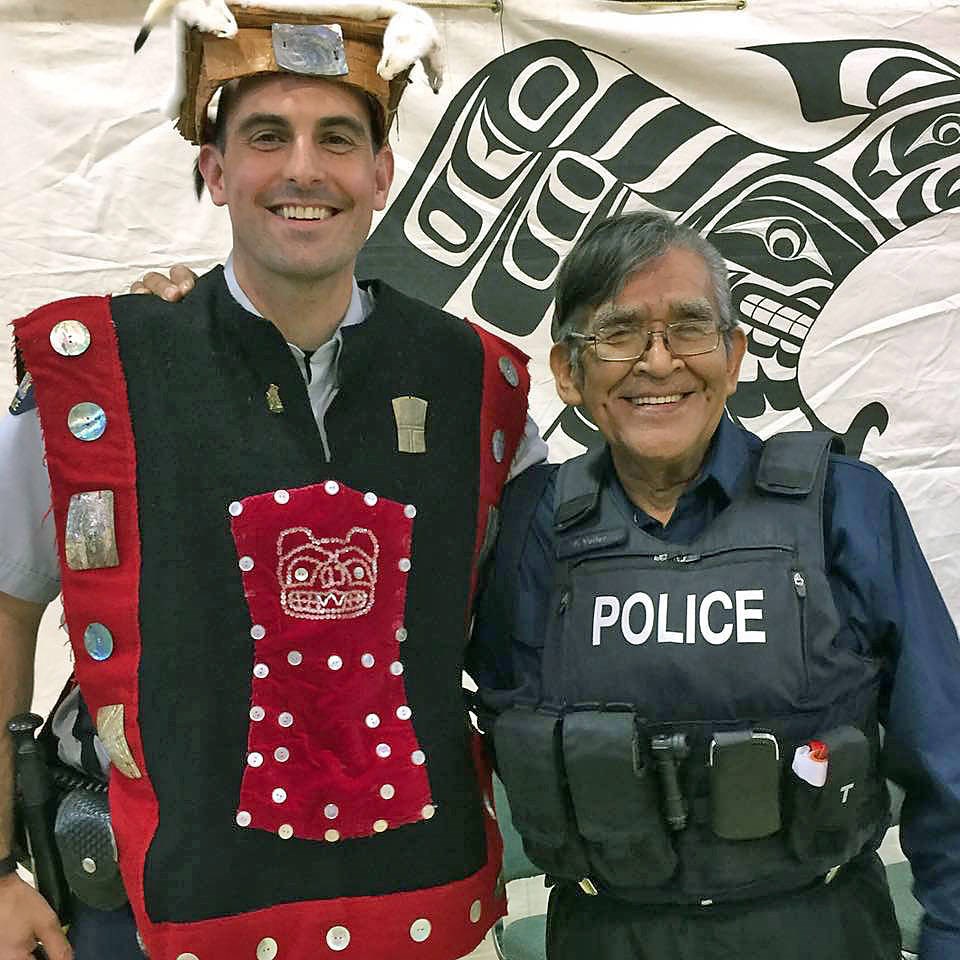Cpl. Chris Voller has had a lot of experiences in his 14 years with the RCMP, but none as special as the 2020 potlatch near Port Hardy where he and Nakwaxda’xw hereditary chief Thomas Henderson literally traded clothing for a ceremonial dance.
In a show of friendship, Voller was dressed in a combination of his police uniform and Henderson’s regalia. Henderson did the same with pieces of Voller’s outfit and his own.
Voller said it was emotional for him, and a privilege to be that welcome at a ceremony that the RCMP had once been part of banning.
The 35-year-old, who is married with two daughters, was among six individuals and three organizations named as recipients of the new B.C. Reconciliation Award. The award was created to recognize commitment to reconciliation with Indigenous Peoples in the province.
“The inaugural recipients of this award are shining examples of those in British Columbia who have demonstrated the many approaches to furthering reconciliation through meaningful action,” said Lt.-Gov. Janet Austin.
Voller, who is now with the Quadra Island RCMP, said every officer posted to Port Hardy goes through cultural training involving Indigenous elders.
His work there led to him being given an Indigenous name, ‘Walas lktsakw — “One who is always generous” or “One who gives greatly.”
Voller was also part of bringing in a managed-alcohol program in conjunction with the First Nations Health Authority.
Under the program, people in custody are able get a controlled dose, similar to providing people on opioids with methadone, and there is acknowledgment that problems with substance abuse can be linked to trauma.
Voller said that while he is proud of being an award recipient for his efforts as a member of the RCMP, he also feels “maybe even a little guilty.”
“So much of this work is not at all individualistic,” he said. “It makes you feel bad that not everyone received that because you work alongside so many great people in these endeavours.”
Keeping Indigenous people away from the judicial system has been an important part of his duties, Voller said.
To relate to Indigenous people, he said it is vital to understand what has happened to them in the past.
“Some of my postings have been in places where there have been forceful relocation for communities, as well as individuals who went to residential schools and were forcibly removed from their families.”
That has led to a disproportionate amount of people who suffer trauma, some of which is multi-generational, he said.
He said reconciliation for one Indigenous group can be something different for another. “You listen and understand the needs of a community, not just your perception of the needs.”
Voller said he is honoured to have been nominated by a number of people, including the four First Nations he policed during his time in Port Hardy, along with several individuals.
“What it really is is a reflection of the environment that we had and that they have up there,” he said. “The fact people acknowledge the need for this work and that we as police manage to be a part of it, I think is crucial moving forward.”
Others being honoured include Dawn Drummond, Doris Paul, Corey Payette, Grand Chief Stewart Phillip and David Suzuki.
Group awards are going to Carrier Sekani Family Services, the Marine Plan Partnership for the North Pacific Coast and xaȼqanaǂ ʔitkiniǂ, the Many Ways of Doing the Same Thing Research Team.
The recipients were chosen by a committee including representation from Indigenous elders and leadership



